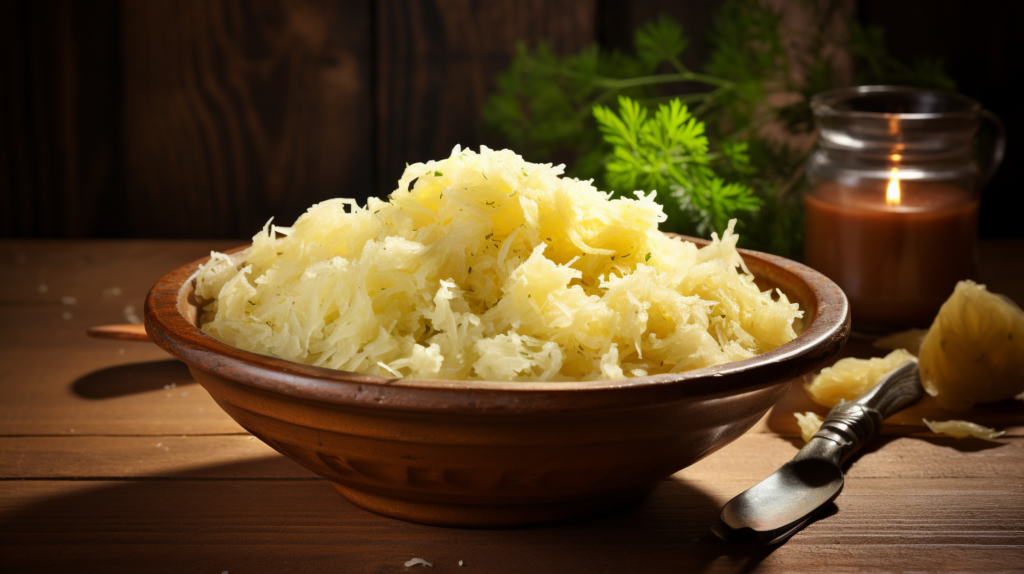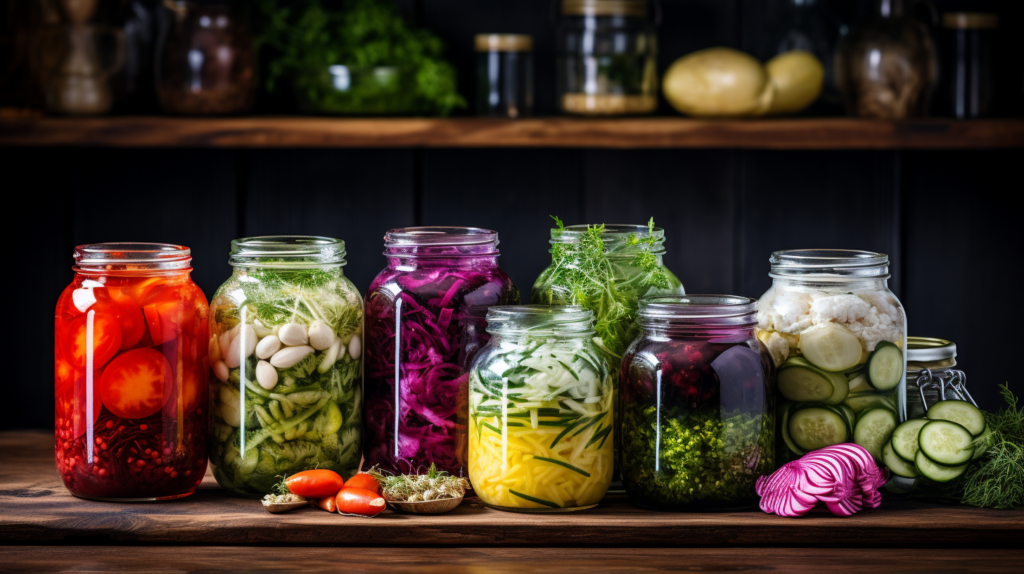You may not know it, but fermented vegetables can have a significant impact on your gut health and digestion. Fermentation is a process in which beneficial bacteria break down the sugars and starches in vegetables, creating lactic acid and other compounds that enhance the nutritional value of these foods. By consuming fermented vegetables, you can restore a healthy balance of bacteria in your gut, improve your digestion, and boost your overall health.
Key Takeaways:
- Fermented vegetables can help improve your gut health and digestion.
- These foods are rich in probiotics, which can promote the growth of beneficial bacteria in your gut.
- Regular consumption of fermented vegetables can aid in nutrient absorption, boost your immune system, and alleviate digestive issues.
- You can easily make your own fermented vegetables at home with simple ingredients and equipment.
- There are many delicious ways to incorporate fermented vegetables into your diet, including salads, wraps, and side dishes.

Understanding the Importance of Gut Health
Your gut plays a crucial role in your overall health and well-being. It’s responsible for digesting the food you eat and absorbing the nutrients your body needs to function properly. Maintaining a healthy gut is essential for optimal digestion, nutrient absorption, and immune function.
Eating gut-friendly foods is key to improving gut health, and fermented vegetables are among the most beneficial options. These probiotic-rich foods can help restore a healthy balance of gut bacteria and support healthy digestion.
Probiotics are live microorganisms that can provide numerous health benefits when consumed in adequate amounts. They’re found in certain foods, such as fermented vegetables, and can also be taken as supplements.
Research has shown that consuming fermented foods can improve gut health and alleviate digestive issues such as bloating, gas, and constipation. Additionally, the probiotics in fermented vegetables can boost immunity and reduce inflammation throughout the body.
Improving Gut Health with Fermented Foods
Incorporating fermented vegetables into your diet is a simple and delicious way to improve gut health. Fermented vegetables can be found at most grocery stores, or you can easily make your own at home.
When selecting fermented foods, look for options that are unpasteurized and raw, as these varieties contain the most beneficial probiotics. Some examples of gut-friendly fermented vegetables include sauerkraut, kimchi, and pickles.
Including fermented vegetables in your diet is a proactive step towards promoting healthy digestion and overall well-being. By making gut-friendly foods a regular part of your meals, you can support your body’s natural processes and feel your best.

The Science Behind Fermentation
If you’re new to the world of fermented vegetables, you may be curious about the process that transforms fresh produce into tangy, flavorful, and probiotic-rich delicacies. Fermentation is a natural chemical process that uses microorganisms to convert sugars into acids, gases, or alcohol. This process preserves the nutrients in the food and adds a variety of beneficial compounds, including probiotics, enzymes, and antioxidants.
When it comes to fermented vegetables, lactic acid fermentation is the most common method. This type of fermentation uses lactic acid bacteria, such as lactobacilli, to convert the sugars in vegetables into lactic acid. Lactic acid acts as a natural preservative, giving fermented vegetables their distinct tangy flavor while preventing harmful bacteria from growing.
The fermentation process also increases the bioavailability of certain nutrients, such as vitamin C and folate, making them more accessible to your body. Additionally, the beneficial bacteria produced during fermentation can help your gut break down and absorb other nutrients more effectively.
The Role of Probiotics in Fermented Vegetables
One of the primary benefits of eating fermented vegetables is their high probiotic content. Probiotics are live bacteria and yeasts that are essential for maintaining a healthy gut microbiome. They work by colonizing the gut and crowding out harmful bacteria, leading to improved digestion, nutrient absorption, and immune function.
The probiotic content of fermented vegetables varies depending on the specific types of bacteria involved in the fermentation process. Some of the most common beneficial bacteria found in fermented vegetables include lactobacilli, bifidobacteria, and pediococci. These bacteria work together to produce a healthy array of probiotic strains that can support a diverse and robust gut microbiome.
| Probiotic Strain | Benefits |
|---|---|
| Lactobacillus plantarum | Improves gut barrier function and reduces inflammation |
| Bifidobacterium lactis | Reduces the risk of antibiotic-associated diarrhea and constipation |
| Pediococcus acidilactici | Produces bacteriocins, which can inhibit the growth of harmful bacteria |
By consuming fermented vegetables regularly, you can introduce a diverse range of probiotics into your gut, helping to support the growth of beneficial bacteria and maintain a healthy balance of microorganisms.
Fun fact: Did you know that sauerkraut was once used by sailors to prevent scurvy on long voyages? The high vitamin C content of cabbage, combined with the probiotic benefits of fermentation, made it a valuable addition to sailors’ diets.
The Benefits of Fermented Vegetables for Gut Flora
Fermented vegetables, such as sauerkraut and kimchi, are rich in probiotics that can support the growth of beneficial bacteria in your gut. This can lead to improved digestion and nutrient absorption, as well as a stronger immune system.
One of the primary benefits of fermented vegetables is their ability to restore and maintain a healthy balance of gut bacteria. This is particularly important given the impact that modern diets and lifestyles can have on gut health. Consuming fermented vegetables can help to offset some of these effects, leading to a healthier gut and improved overall well-being.
Research has also suggested that fermented vegetables may help to alleviate various digestive issues. For example, a study published in the Journal of Medicinal Food found that consuming fermented vegetables improved constipation symptoms in participants with functional constipation.
| Benefit | Details |
|---|---|
| Improved gut flora | The probiotics in fermented vegetables can help restore and maintain a healthy balance of bacteria in the gut, leading to improved digestion and nutrient absorption. |
| Alleviates digestive issues | Studies have indicated that fermented vegetables can help alleviate constipation symptoms in people with functional constipation. |
| Stronger immune system | The probiotics and other beneficial compounds found in fermented vegetables can help strengthen the immune system and support overall health. |
If you’re looking to improve your gut health, incorporating fermented vegetables into your diet is a great place to start. Not only are they delicious, but they’re also easy to make at home and can be enjoyed in a variety of ways.
Try topping your next sandwich or salad with some homemade sauerkraut or adding some kimchi to your stir-fry. With their rich flavor and numerous health benefits, fermented vegetables are a must-try for anyone looking to support their gut health.

Boosting Immunity with Fermented Vegetables
If you’re looking to strengthen your immune system, fermented vegetables may be just what you need. These probiotic-rich foods have numerous health benefits, including immune-boosting properties that can help keep you healthy and well.
Fermented vegetables contain beneficial bacteria that stimulate the production of antibodies, which are essential for fighting off infections and diseases. In fact, research has shown that consuming fermented foods can reduce the risk of respiratory infections and other illnesses.
In addition to boosting your immunity, fermented vegetables can also improve your gut health. By promoting the growth of beneficial bacteria in your gut, they can help keep your digestive system functioning properly and reduce inflammation in your body.
“The probiotics found in fermented vegetables can strengthen the immune system and support overall health.”
Some of the specific benefits of fermented vegetables for immunity and gut health include:
| Benefit | Description |
|---|---|
| Reduced inflammation | The beneficial bacteria in fermented vegetables can reduce inflammation in the body by balancing the gut microbiome. |
| Improved nutrient absorption | By promoting a healthy gut, fermented vegetables can improve your body’s ability to absorb nutrients from your food. |
| Increased production of antibodies | Fermented vegetables can stimulate the production of antibodies, which are essential for fighting off infections and diseases. |
Incorporating fermented vegetables into your diet is a simple and effective way to support your immune system and improve your gut health. Try adding them to your meals as a side dish, topping your salads, or including them in wraps or sandwiches.
Not sure where to start? Check out some delicious fermented vegetable recipes for inspiration and start reaping the benefits of these probiotic-rich foods today.
Enhancing Digestion with Fermented Vegetables
You may be wondering how fermented vegetables aid digestion. Here are some ways in which fermented vegetables promote good gut health:
- Increased production of digestive enzymes: Fermented vegetables contain enzymes that break down food, making it easier for your body to absorb nutrients.
- Improved gut motility: The fiber in fermented vegetables promotes healthy bowel movements, reducing the risk of constipation and other digestive issues.
- Alleviation of common digestive issues: The probiotics in fermented vegetables can help relieve common gastrointestinal problems such as bloating, gas, and indigestion.
If you’re looking for gut-friendly recipes that incorporate fermented vegetables, here are a few options:
“Kimchi Fried Rice” – Stir-fry cooked rice with kimchi, scrambled eggs, and chopped vegetables for a flavorful and nutritious meal.
“Cabbage Slaw with Ginger Miso Dressing” – Mix shredded cabbage and carrots with a dressing of miso paste, ginger, and sesame oil for a refreshing and probiotic-rich side dish.
“Fermented Carrots” – Slice carrots into rounds and ferment with garlic, dill, and sea salt for a tangy and crunchy snack.
By consuming these gut-friendly recipes, you can easily incorporate fermented vegetables into your diet and improve your digestion.

The Process of Fermenting Vegetables at Home
If you’re interested in reaping the benefits of fermented vegetables, why not try making your own homemade batch? Fermenting vegetables at home is a simple process that requires minimal equipment and can be customized to suit your preferences.
Step 1: Selecting the Right Vegetables
Choose fresh, organic vegetables that are ripe and in season. Some popular choices for fermenting include cabbage, carrots, cucumbers, and beets. Wash your vegetables thoroughly and chop them into bite-sized pieces.
Step 2: Preparing for Fermentation
Place your chopped vegetables into a clean, wide-mouth jar, leaving about an inch of space at the top. You can add additional flavorings such as garlic, ginger, or herbs at this stage. Next, prepare a brine solution by dissolving 1-2 tablespoons of sea salt in 4 cups of filtered water. Pour the brine over the vegetables, making sure they are fully submerged.
Step 3: Wait and Watch
Seal the jar with a lid or cover it with a clean cloth secured with a rubber band. Store the jar at room temperature, away from direct sunlight and extreme temperatures. Check your ferment every few days to ensure the vegetables are still submerged and mold hasn’t formed on the surface.
Step 4: Taste Test and Storage
After 5-7 days, start tasting your ferment to check for desired flavor and texture. Once the vegetables have developed the right amount of tanginess and crunch, it’s time to transfer the jar to the fridge to slow down the fermentation process. Your homemade fermented vegetables can be stored in the fridge for up to six months.
With these simple steps, you can enjoy the benefits of homemade fermented vegetables while also having the satisfaction of knowing you made it yourself!

Delicious Fermented Vegetable Recipes
If you’re looking to incorporate more fermented veggies into your diet, there are plenty of delicious recipes to choose from. Not only do they provide numerous health benefits, but they also add a tasty and tangy flavor to your meals.
Fermented Carrots
“These fermented carrots are the perfect addition to any meal or snack. They’re crunchy, tangy, and oh-so-nutritious!”
| Ingredients: | Instructions: |
|---|---|
|
|
Fermented Beets
“These fermented beets are a colorful and flavorful addition to any salad or sandwich. Plus, they’re packed with gut-healthy probiotics.”
| Ingredients: | Instructions: |
|---|---|
|
|
Fermented Cabbage
“This classic sauerkraut recipe is simple and straightforward. Serve it as a side dish or add it to your favorite sandwich for a boost of probiotics.”
| Ingredients: | Instructions: |
|---|---|
|
|
Experiment with different types of vegetables and seasonings to find your favorite fermented veggie recipes. Your gut will thank you!
Incorporating Fermented Vegetables into Your Diet
If you want to reap the benefits of fermented vegetables, it’s essential to incorporate them into your diet. Here are some practical tips to get you started:
- Start small: Introduce fermented vegetables gradually, especially if you’re new to them. Begin with a small amount and gradually increase the portion size.
- Include them in meals: Fermented vegetables can be added to a variety of dishes, including salads, sandwiches, and stir-fries. Experiment with different recipes to find what you enjoy the most.
- Make your own: Fermenting vegetables at home is an easy and cost-effective way to enjoy them. Follow proper safety guidelines and consult reliable resources for guidance on the fermentation process.
- Pair them with other gut-friendly foods: Combine fermented vegetables with other gut-friendly foods, such as kefir, kombucha, and yogurt, to further enhance the probiotic content of your meals.
- Consider dietary restrictions: If you have any dietary restrictions, be sure to choose fermented vegetables that fit within your dietary requirements. For example, if you’re vegan, look for vegetable-based fermented products, such as sauerkraut or kimchi, rather than those containing animal products like fish sauce.
Remember that fermented vegetables are just one piece of the puzzle when it comes to gut health. A well-rounded diet that includes a variety of gut-friendly foods, such as whole grains, fruits, and vegetables, is crucial for optimal digestion and overall well-being.

Other Gut-Friendly Foods to Consider
In addition to fermented vegetables, there are other foods you can include in your diet to promote gut health and improve digestion. These foods are also rich in probiotics and fiber, making them excellent choices for a healthy gut.
Yogurt
Yogurt is a probiotic-rich food that can help improve gut flora and boost immunity. It contains beneficial bacteria such as Lactobacillus and Bifidobacterium, which aid digestion and reduce inflammation in the gut. Choose plain, unsweetened yogurt with no added colors or flavors to avoid unnecessary sugars and additives.
Kefir
Kefir is a fermented drink made from milk or water, and it contains a variety of beneficial yeasts and bacteria that can support digestive health. It is also high in protein, calcium, and vitamins, making it a nutritious addition to your diet. Look for unsweetened kefir with no added sugars or artificial flavors.
Sauerkraut
Sauerkraut is a fermented cabbage dish that is rich in beneficial bacteria and other immune-boosting compounds. It can improve digestion, promote nutrient absorption, and reduce inflammation in the gut. Choose fresh, raw sauerkraut without added preservatives or vinegar for maximum health benefits.
Kombucha
Kombucha is a fermented tea beverage that contains probiotics and antioxidants. It can aid digestion, boost immunity, and reduce inflammation throughout the body. Be sure to choose brands with low sugar content to avoid excess added sugars.
Whole Grains
Whole grains such as oats, quinoa, and brown rice are high in fiber and other nutrients that can improve digestive health. They can also help regulate blood sugar levels and reduce the risk of chronic diseases. Incorporate whole grains into your meals by choosing whole-grain bread, pasta, and cereals.
Beans
Beans are an excellent source of fiber, protein, and minerals, making them a great addition to your gut-friendly diet. They can help reduce inflammation in the gut and promote regular bowel movements. Choose a variety of beans such as black beans, kidney beans, and chickpeas to add to salads, soups, and stews.
By incorporating these gut-friendly foods into your diet, you can support the health of your gut and improve digestion. Remember to choose whole, minimally processed foods to maximize their health benefits.

Conclusion
Incorporating fermented vegetables into your diet is a simple and effective way to improve your gut health. As we have seen, fermented vegetables provide numerous benefits, including restoring and maintaining a healthy balance of bacteria in the gut, boosting immunity, and supporting optimal digestion. By making gut-friendly foods a regular part of your diet, you can improve your overall well-being and enjoy a more comfortable digestive system.
In addition to fermented vegetables, there are other probiotic-rich and gut-friendly foods you can consider, such as kefir, kimchi, and yogurt. By incorporating a variety of these foods, you can ensure that your gut is receiving a range of beneficial bacteria and nutrients.
Remember, proper digestion is key to a happy and healthy life. By making small changes to your diet and incorporating fermented vegetables and other gut-friendly foods, you can take the first steps toward improving your gut health and overall well-being. So go ahead and give them a try – your gut will thank you!
FAQ
What are fermented vegetables?
Fermented vegetables are vegetables that have undergone a process called fermentation, where beneficial bacteria break down the natural sugars in the vegetables, resulting in a tangy and flavorful product.
How do fermented vegetables improve gut health?
Fermented vegetables contain probiotics, which are beneficial bacteria that help restore and maintain a healthy balance of bacteria in the gut. This can improve digestion, nutrient absorption, and overall gut health.
What are the benefits of consuming fermented vegetables?
Consuming fermented vegetables can help improve gut flora, aid digestion, boost immunity, and enhance overall health. They are also a great source of probiotics, vitamins, and minerals.
How can fermented vegetables be incorporated into a diet?
Fermented vegetables can be enjoyed as a side dish, added to salads, wraps, or sandwiches, or used as a flavor enhancer in various recipes. They can be eaten on their own or combined with other ingredients to create delicious and nutritious meals.
Can I make fermented vegetables at home?
Yes, you can make fermented vegetables at home. It involves selecting the right vegetables, preparing them for fermentation, and following a step-by-step process to ensure a safe and successful fermentation. There are many resources available online that provide detailed instructions on how to ferment vegetables at home.
Are there any other gut-friendly foods I should consider?
Yes, in addition to fermented vegetables, other gut-friendly foods include yogurt, kefir, sauerkraut, kimchi, tempeh, and kombucha. These foods are rich in probiotics and can further support gut health and digestion.














